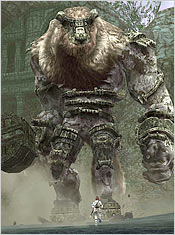
Fumito ueda’s game Ico slipped quietly onto U.S. shelves in the wake of the World Trade Center disaster. Saddled with awful box art and a weak advertising campaign, the game foundered commercially but was embraced with cultlike fervor by gamers. Ueda, who describes his philosophy of game creation as “design by subtraction,” had stripped a classic adventure game to its barest bones: A boy, rejected by his village, leads a princess to safety from a dark tower. The game is a calm and lyrical sequence of puzzles, a measured progression through castle rooms and courtyards; there is no death in Ico, only smoke monsters that you dissipate by swatting with a stick.
Unlike many great video games that excite without exactly delighting the eye, this game is beautiful, an exquisitely detailed world of torchlight flickering on vast brick halls and strange stone idols. It is also a game of unparalleled sensuality—you find yourself pausing on a walkway high above the glittering sea, holding the princess’s hand, the sun on your face as the cries of seagulls disappear into the wind. Transporting at a time when many players needed to be transported, Ico remains one of the best games ever created for PlayStation 2.
It has taken Ueda four years to develop the follow-up, Shadow of the Colossus. The game is every bit as pared down as its predecessor, but where Ico is cerebral, Colossus is visceral. It’s designed as a minimal auteurist take on the action genre, in which players complete a sequence of goals, overcoming obstacles and minor enemies to reach a climactic confrontation with a superpowered enemy—the “boss fight.” For Colossus, Ueda has cut all distractions. The narrative is simple: To save the life of a girl, a hero must destroy sixteen beasts, the colossi—a series of boss fights.
That said, calling the game a series of boss fights is as coarsely accurate as referring to a Balanchine work as a bunch of people jumping about in tights. What Ueda has done is to fold and twist each level until the process of finding the colossus, climbing it, and attacking its Achilles’ heel constitutes an incredibly rich experience. The creature design is extraordinary, both at a mythical-aesthetic level and at the level of game play: Ueda keeps the experience varied through colossi that range in size from the equivalent of a small tractor trailer to the size of a skyscraper, giving them speeds ranging from slow and stately to fast and lethal and setting them in habitats from fields to lakes to air.
And those habitats are stunning: The game takes place in the Ico universe but is even more beautiful. Indeed, the level design encourages the player to explore the sprawling landscape of sand deserts and grassy plains, misty valleys and forests pierced with shafts of light. It’s a palpably ancient world, built on the ruins of older civilizations being swallowed by the earth. The colossi, too, seem ancient, impossibly huge beings of crumbling masonry and moss-colored fur, equal parts Mayan architecture and Papua mud-man mask; watching the creatures stomp across the land or glide through the air is transfixing.
But it is the emotional tenor of the game that leaves the most lasting impression. The quest is an immersion in solitude, the hero and his horse passing alone under vast and leaden skies. Moreover, it is a quest pursued in a moral vacuum—you do not know the right or wrong of killing the creatures, just that it is what you must do. Each victory over a colossus becomes profoundly ambivalent, the feeling of triumph undercut by a sense of wretchedness at having destroyed something so awe inspiring. And Ueda twists the knife: The beasts are dormant until you goad them into fighting, and when each dies, the music turns sweepingly elegiac.
Beating the final colossus triggers a long sequence that resolves the narrative, but only partially: Ueda lets the story resonate by finishing on an ambiguous note. It’s a beautifully judged ending and impressive testimony to Ueada’s procecss of subtraction.
Shadow of the Colossus
Fumito Ueda.
SCEA. Playstation 2.